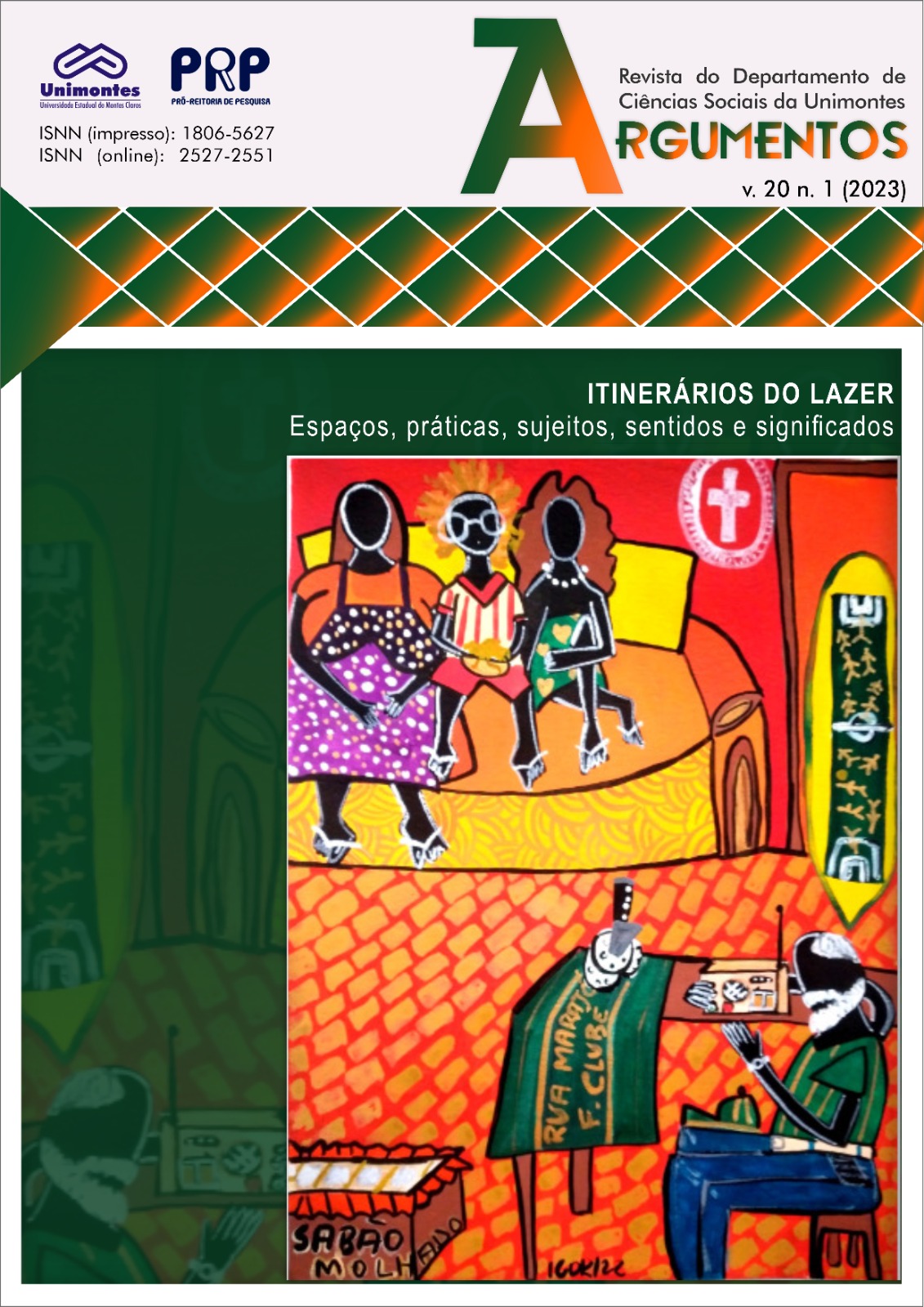In the street trabalho is made: music and religiosity among rastafarians in the periphery of São Paulo
DOI:
10.46551/issn.2527-2551v20n1p.107-132Keywords:
Rastafari; Music; Religion; Leisure; Coloniality.Abstract
Music has become one of the greatest forms of expression for Rastafari, a cultural movement that emerged in 1930 in Jamaica and that during its development established connections between religiosity, politics, leisure and work. Despite its transnationalization being associated with the dissemination of a vehicle of popular culture, reggae music, it is in the nyahbinghi that resides the main spiritual and musical source, being a service (ceremony or spiritual work) where chants (hymns) are sung to the playing of three main drums. In this article, aspects of the organization of a group formed by Rastafarians, the Instituto Cultural Bola de Fogo, will be addressed, presenting reflections on the practice of nyahbinghi from the field work carried out in the ritual-performances that take place in the city. For a better contextualization, I will initially bring some historical considerations about Rastafari and its musicality, which leads to a policy against colonialism and coloniality. Past and present converge, as well as the material and the spiritual, bringing ancestral knowledge and healing benefits. Inserted in peripheral leisure events, one can see the importance of politics and religion emerging in the streets and public spaces in the city.
Downloads
References
ANOBA, Ibrahim B. Africa shall stretch her hands unto God: Ethiopianism as a Pan-African Religious Freedom Movement (1880–1940)”. Journal of Church and State, Vol. 64, n.1, pp. 42–67, 2022.
BÂ, Amadou Hampâté. Tradição Viva. In: KI-ZERBO, Joseph (org.). História geral da África, I: Metodologia e pré-história da África. Brasília: UNESCO, 2010.
BARNETT, Michael. From Wareika Hill to Zimbabwe: expliring the role of rastafari in popularizing reggae music. In: BARNETT, Michael & NETTLEFORD, Rex (Orgs). Rastafari in the New Millennium. Nova Iorque: Syracuse University Press, 2014.
BARRETT, Leonard E. The Rastafarians. Boston: Beacon Press, 1997.
BLACKING, John. Música, Cultura e Experiência. Cadernos de Campo, n.16, pp. 201-218, 2007.
BONACCI, Giulia. Exodus!: Heirs and Pioneers, Rastafari Return to Ethiopia. Kingston: The University of the West Indies Press, 2015.
CARDOSO, Vânia Zikán. Narrar o mundo: estórias do "povo da rua" e a narração do imprevisível. Mana 13 (2), 2017.
DAMATTA, Roberto. A Casa e a Rua: espaço, cidadania, mulher e morte no Brasil. Rio de Janeiro: Rocco, 1997.
DOUGLAS, Mary. Pureza e perigo. São Paulo: Perspectiva, 2019.
FELTRAN, Gabriel de Santis. Periferias, direito e diferença: notas de uma etnografia urbana. Revista de Antropologia, 53(2), 2012.
GROISMAN, Alberto. Eu Venho da Floresta: Um estudo sobre o contexto simbólico do uso do Santo Daime. Florianópolis: Editora da UFSC, 1999.
GROSFOGUEL, Ramon. Para descolonizar os estudos de economia política e os estudos pós-coloniais: transmodernidade, pensamento de fronteira e colonialidade global. Revista Crítica de Ciências Sociais, n. 80, pp. 115-147, 2008.
GILROY, Paul. O Atlântico Negro. São Paulo: Editora 34, 2019.
HARRIS, R. Garveyism and Marxism. Harlem, New York: United Brothers
Communications Systems, 1978.
HARVEY, Amnifu R. A Black Community Development Model: The Universal Negro Improvement Association and African Communities League 1917-1940. The Journal of Sociology & Social Welfare. Vol. 21, n. 1, 1994.
HEBDIGE, Dick. Cut ‘n’ Mix: culture, indetity and Caribbean music. Abingdon: Routledge, 2007.
HOPKINS, Elizabeth. The Nyabinghi Cult of southwestern Uganda. In: ROTBERG, R. (org). Rebellion in Black Africa. Nova Iorque: Oxford University Press, 1971.
LANDER, Edgardo. La colonialidad del saber: eurocentrismo y ciencias sociales, perspectivas latino-americanas. Buenos Aires: Clacso, 2000.
MAKL, Luis F. Artes musicais na diáspora africana: improvisação, chamada-e-resposta e tempo espiralar. Outra Travessia, n. 11, pp. 55-70, 2011.
MALDONADO-TORRES, Nelson. Analítica da colonialidade e da decolonialidade: algumas dimensões básicas. In: BERNARDINO-COSTA, Joaze; MALDONADO-TORRES, Nelson & GROSFOGUEL, Ramón (Orgs). Decolonialidade e Pensamento Afrodiaspórico. Belo Horizonte: Autêntica, 2020.
MIGNOLO, Walter. La descolonización del ser y del saber. In: MIGNOLO,
Walter; SCHIWY, Freya; MALDONADO-TORRES, Nelson (orgs). Des-colonialidad del ser y del saber: (videos indígenas y los límites coloniales de la izquierda) en Bolivia. Buenos Aires: Del Signo, pp. 25-30, 2006.
PARTRIDGE, Christopher. Dub in Babylon. Londres: Equinox, 2010.
QUIJANO, Aníbal. Colonialidad del poder y clasificación social. Journal of World-Systems Research, v. 11, n. 2, p. 342-386, 2000.
RABELO, Danilo. Rastafári: Identidade e hibridismo cultural na Jamaica – 1930-1981. Brasília, 2006. Tese (Doutorado em História) – Universidade de Brasília.
RECKORD, Verena. From Burru Drums to Reggae Ridims: the evolution of rasta music. In: MURRELL, Nathaniel Samuel; SPENCER, William David; MCFARLANE, Adrian Anthony (orgs). Chanting Down Babylon. Filadélfia: Temple University Press, 1998.
SANTOS, David J. S. Pregando Rastafari por entre as Notas Musicais: As mensagens dos rastas de Alagoas transmitidas pelas canções. Capoeira – Revista de Humanidades e Letras, Vol. 1 (1), pp. 94-106, 2014.
SAVISHINSKY, Neil J. Rastafari in the Promised Land: the spread of a jamaican socio-religious movement among the youth of West Africa. African Studies Review, Vol. 37, No. 3, pp. 19-50, 1994.
SCHECHNER, Richard. The Future of Ritual: writings on culture and performance. Nova Iorque: Routledge, 1995.
_______. Pontos de contato entre o pensamento antropológico e teatral. Cadernos de campo, São Paulo, n. 20, pp. 213-236, 2011.
SHEPPERSON, George. Ethiopianism and African Nationalism. Phylon (1940-1956), Vol. 14, n. 1, pp. 9-18, Clark Atlanta University, 1953.
STEBBINS, Robert A. & ELKINGTON, Sam. The Serious Leisure Perspective: an introduction. Londres e Nova Iorque: Routledge, 2014.
STRAW, Will. System of articulation, logics of change: communities and scenes in popular music. Cultural Studies 53, pp.368-88, 1991.
TAMBIAH, Stanley J. Culture, Thought and Social Action: An anthropological perspective. Cambridge: Harvard University Press, 1985.
TAVARES, Breitner. Na quebrada, a parceria é mais forte: Jovens, vínculos afetivos e reconhecimento na periferia. São Paulo/Brasília, Annablume/Fundo de Apoio a Cultura do Distrito Federal, 2012.
TURNER, Victor. Do Ritual ao Teatro: a seriedade humana de brincar. Rio de Janeiro: Editora UFRJ, 2015.







.png)










.png)





